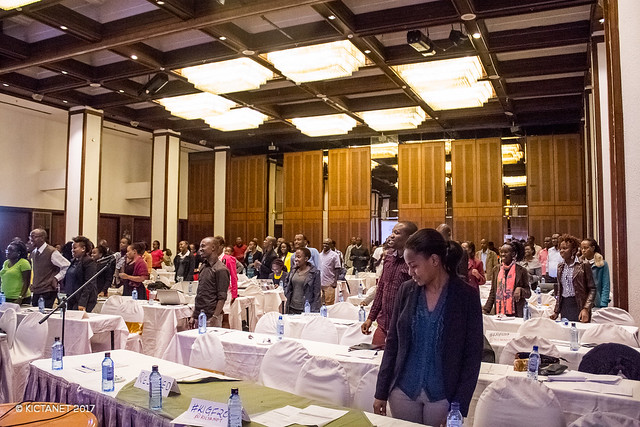The Kenya IGF week shall be held from 29th July to 1st August 2019 at the Panafric Hotel, in Nairobi.
The IGF week has a series of activities including the Kenya School of Internet Governance (KeSIG), policy briefs dissemination workshops, and culminates in the flagship Kenya Internet Governance Forum.
Kenya School of Internet Governance (KeSIG)
KeSIG has grown to be among KICTANet’s flagship programmes, and its success has not been only in bringing in new voices but also encouraging those whose work has been disrupted by the internet to understand and contribute to internet policy making processes. In its 4th edition, KeSIG deliberately targets law enforcement officers, civil society organisation officers, traditional and new media practitioners, the tech community and academics. Its aim remains to build capacity for local and global internet governance by leveraging on existing policy advocates from areas such as media, human rights, devolved government and law enforcement and adding new voices Areas to be covered in the training include: introduction and main issues in internet governance; internet governance processes and how to get involved; and Kenya’s internet governance frameworks. The faculty is sourced from local and African actors such as the regulators, the executive, civil society leaders , digital rights activists, lawyers and technical community.
KeSIG’s mission is to increase capacity of key actors and potential actors in the local internet governance space. These include traditional human rights defenders and civil society organisations, students, academia, tech community and government departments. These actors are also commissioned to participate in international internet policy making for a thereby contributing African perspectives in global debates.
Kenya IGF
The Internet Governance Forum (IGF) is an open and inclusive multi-stakeholder forum where public policy issues related to key elements of Internet governance issues, such as the Internet’s sustainability, robustness, security, stability and development. The United Nations Secretary-General formally announced the establishment of the IGF in July 2006 and the first meeting was convened in October 2006.
The purpose of the IGF is to maximize the opportunity for open and inclusive dialogue and the exchange of ideas on Internet Governance (IG) related issues; create opportunities to share best practices and experiences; identify emerging issues and bring them to the attention of the relevant bodies and the general public; and contribute to capacity building for Internet governance.
The event brings together stakeholders representing government, the private sector, civil society, the technical and academic community, and the public in an informal setting for policy dialogue on Internet governance issues on an equal basis through an open and inclusive process. This type of cooperative engagement is usually referred to as the multistakeholder model of Internet Governance, which is one of the key features for the Internet’s success. This model is paramount to ensure that the Internet remains sustainable for economic and social development.
The forums are localised and their outcomes feed into each other from country to the global level. The outcomes of the country level (Kenya IGF) feed into the regional level (East Africa IGF), continental level (Africa IGF) and ultimately at the global level (IGF). Previously, Kenya hosted the East Africa IGF in 2009 and thereafter, the global IGF in 2011 in Nairobi.
This year, the 14th Annual Global IGF Meeting convened by the United Nations, will be hosted by the Government of Germany and is scheduled to take place from 25 – 29 November 2019 in Berlin.
Side events: Policy briefs dissemination workshops
Several side events will be held during the IGF week. One of them will be the policy brief on Regulation OTTs – the challenges and recommendations.
More to follow …




